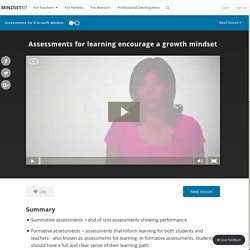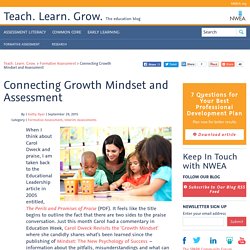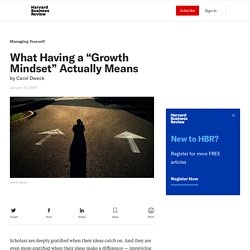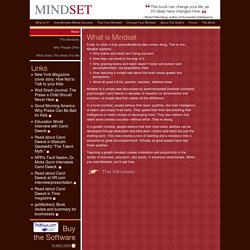

Growth Mindset Lesson Resources. Growth Mindset on Pinterest. Promoting Growth Mindset Through Assessment. Assessment for Growth Mindset. Assessments for learning encourage a growth mindset, Assessments For A Growth Mindset. The feedback we give students through assessments influences their mindsets.

In many classrooms, student take a test at the end of the unit to see if they've learned the material or not, which can lead students to focus on their performance. However, assessments are critical during learning, to shed lights on students' learning progress, what they have learned and what they haven't learned yet. These types of assessments, called assessments for learning or formative assessments, help students develop a growth mindset by focusing them on their learning and understanding instead of just the final grade.
Feedback for students is descriptive and emphasizes their strengths, identifies challenges, and points to next steps. Let's hear more about the impact of assessments for learning from Jo Boaler: So assessment for learning is for helping students know where they are and also how they can be successful. Then they added a third group. Assessments For A Growth Mindset. Connecting Growth Mindset and Assessment. When I think about Carol Dweck and praise, I am taken back to the Educational Leadership article in 2005 entitled, The Perils and Promises of Praise (PDF).

It feels like the title begins to outline the fact that there are two sides to the praise conversation. Just this month Carol had a commentary in Education Week, Carol Dweck Revisits the ‘Growth Mindset’ where she candidly shares what’s been learned since the publishing of Mindset: The New Psychology of Success – information about the pitfalls, misunderstandings and what can be done (Dweck 2015). In my post about superheroes and growth mindset I quoted Dweck’s definition of a growth mindset – In this mindset, the hand you’re dealt is just the starting point for development. This growth mindset is based on the belief that your basic qualities are things you can cultivate through your efforts…everyone can change and grow through application and experience. Khan Academy Growth Mindset Lesson Plan.
How to Teach Kids About the Power of a Growth Mindset - Homeschooling with Dyslexia. Growth Mindset Lesson Plan. Resources for Teaching Growth Mindset. Growth Mindset Ted Talk. Fixed vs. Growth: The Two Basic Mindsets That Shape Our Lives. “If you imagine less, less will be what you undoubtedly deserve,” Debbie Millman counseled in one of the best commencement speeches ever given, urging: “Do what you love, and don’t stop until you get what you love. Work as hard as you can, imagine immensities…” Far from Pollyanna platitude, this advice actually reflects what modern psychology knows about how belief systems about our own abilities and potential fuel our behavior and predict our success. Much of that understanding stems from the work of Stanford psychologist Carol Dweck, synthesized in her remarkably insightful Mindset: The New Psychology of Success (public library) — an inquiry into the power of our beliefs, both conscious and unconscious, and how changing even the simplest of them can have profound impact on nearly every aspect of our lives.
One of the most basic beliefs we carry about ourselves, Dweck found in her research, has to do with how we view and inhabit what we consider to be our personality. What Having a “Growth Mindset” Actually Means. Andrew Nguyen/HBR STAFF Scholars are deeply gratified when their ideas catch on.

And they are even more gratified when their ideas make a difference — improving motivation, innovation, or productivity, for example. But popularity has a price: people sometimes distort ideas, and therefore fail to reap their benefits. This has started to happen with my research on “growth” versus “fixed” mindsets among individuals and within organizations. To briefly sum up the findings: Individuals who believe their talents can be developed (through hard work, good strategies, and input from others) have a growth mindset. In the wake of these findings, “growth mindset” has become a buzzword in many major companies, even working its way into their mission statements. What is Mindset.
Every so often a truly groundbreaking idea comes along.

This is one. Mindset explains: Why brains and talent don’t bring success How they can stand in the way of it Why praising brains and talent doesn’t foster self-esteem and accomplishment, but jeopardizes them How teaching a simple idea about the brain raises grades and productivity What all great CEOs, parents, teachers, athletes know Mindset is a simple idea discovered by world-renowned Stanford University psychologist Carol Dweck in decades of research on achievement and success—a simple idea that makes all the difference. Carol Dweck Revisits the 'Growth Mindset' Opinion By Carol Dweck For many years, I secretly worked on my research. I say “secretly” because, once upon a time, researchers simply published their research in professional journals—and there it stayed.
However, my colleagues and I learned things we thought people needed to know. We found that students’ mindsets—how they perceive their abilities—played a key role in their motivation and achievement, and we found that if we changed students’ mindsets, we could boost their achievement. So a few years back, I published my book Mindset: The New Psychology of Success to share these discoveries with educators. —Jori Bolton for Education Week This is wonderful, and the good word continues to spread. Science Behind Growth Mindset. Over 30 years ago, Carol Dweck and her colleagues became interested in students' attitudes about failure.
They noticed that some students rebounded while other students seemed devastated by even the smallest setbacks. After studying the behavior of thousands of children, Dr. Dweck coined the terms fixed mindset and growth mindset to describe the underlying beliefs people have about learning and intelligence. When students believe they can get smarter, they understand that effort makes them stronger. Therefore they put in extra time and effort, and that leads to higher achievement. Recent advances in neuroscience have shown us that the brain is far more malleable than we ever knew. At the same time that these neuroscientific discoveries were gaining traction, researchers began to understand the link between mindsets and achievement. Mindset the new Psychology of success - Great Video to Motivate YOU.
Carol Dweck - A Study on Praise and Mindsets. Growth Mindset Quote. Growth Mindset Quote.